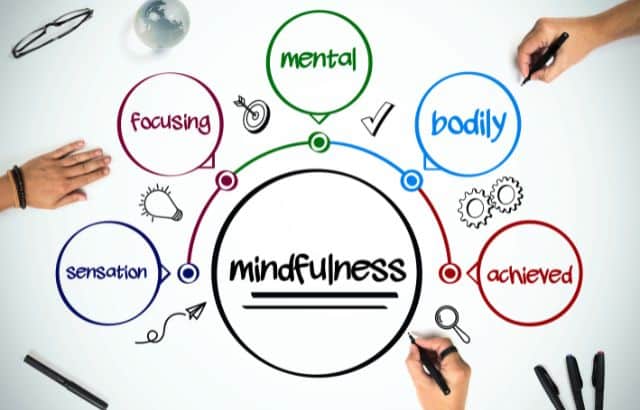In today’s globalized business world, more and more organizations, businesses, and industries are immensely concerned about the importance of their human capital and also do care about their mental and bodily wellbeing. Guided by the research, the organizations tend to give more stress on mindfulness in the workplace, specifically for their employees. The employers are turning their minds to implement mindfulness programs to tackle issues around employee health in a highly-demanding atmosphere at the workplaces. In this column, the very famous Strategics Consultant, Astro Strategist cum Business Astrologer Hirav Shah explains the importance of mindfulness at the workplace and how it can benefit your business in remarkable ways.
Table of Contents
What is mindfulness?

Astro Consultant Hirav Shah says, “When you practice mindfulness at home or mindfulness in the workplace, you’ll be a better version of you and it is very important to have strategic guidance.
Your cellphone is buzzing, your work phone is ringing, and your boss asks you into her office. On top of that, there is a pile of paperwork that screams for your attention. So what do you do? Well, if you’re like most workers in the 21st century, you “multitask.”
True multitasking is not possible. You heard correctly. It is physically impossible to split your attention so that you can accomplish two work tasks at the same time.”
He adds, “Mindfulness means staying fully aware of all external and internal changes in a non-judgmental manner. Mindfulness helps in coping with stress; aids better concentration and gets along better with other people. This brings more efficiency to businesses and organizations. Mindfulness is an ancient and integral part of many meditation practices.”
Hirav Shah quotes “Mindfulness is the ability to know what’s happening in your head at any given moment without getting carried away by it.”
“People who try to multitask are less effective when they focus on two or more tasks than they would be if they focused on one thing until it was done. This is where “mindfulness” comes in.
People who have been trained in ‘mindfulness’ say that they become more aware of how their own mind works. They see how their own filters impact perceptions and therefore the decisions they make.”
Benefits of Mindfulness in the Workplace
The studies reveal that the people who have gone through mindfulness courses develop skills that are invaluable in the work environment. The benefits include:
- Helps in remaining calm and focused in the face of multiple demands
- Concentrate better for longer and communicate more clearly
- Perform better within teams and for clients, even with other stakeholders
- Exhibit less stress, anxiety, and depression
- Bring more productivity and less absenteeism
What is Mindfulness training?

Typically, the mindfulness training includes exercises and practices such as:
- – Learn to develop calmness in a given moment through breathing and other
- Learn to tune body and mind for directly experiencing the feelings and emotions
- Recognizing our habits and patterns of reaction to stress and difficulties
- Developing emotional intelligence and responding to stressful situations in a more seasoned and relaxing way
- Learn to be kind to ourselves and others
- The training of mindfulness in the workplace does focus on two aspects. The first job is to learn how to stay calm and focused in the face of diverse stress factors. The second is about how we can relate to other people and events with acceptance and kindness through better communication with colleagues and others.
The employers tend to realize the advantages of mindfulness at work and the related investment in this. There is a growing notion among employers that mindfulness aids flourishing, boosts performance, improves teamwork, and customer relations. The research on mindfulness at work shows that mindfulness is linked to improving skills such as regulating attention and behavior.
Workplace Mindfulness Practices – Attention and Mindfulness
Attention is a fundamental skill. The research shows that people tend to think about something else than what they are doing for almost half of their working hours. However, this attention can be improved. Even a limited amount of mindfulness training can also help to stabilize attention. Meditation can also improve the ability to disengage from mind wandering. These meditational practices are also very helpful in coping with inner and outer distractions in modern workplaces. In fact, these meditational measures would help in remaining attentive for a longer period of time. It is directly linked to feelings of happiness and to improvements in fluid intelligence that is the ability to think out of the box.
Hirav Shah concludes by saying, Mindfulness enables people to be more aware of the importance of the present as opposed to the past or the future. Those who practice mindfulness usually start with deep breathing then focus on one thing. This added focus helps people become more productive, creative, patient, and understanding.”
FAQs on Workplace Mindfulness Practices for Enhanced Productivity

What are effective techniques for enabling mindfulness in the workplace?
Answer: Effective techniques include incorporating mindfulness breaks, providing meditation spaces, encouraging deep-breathing exercises, and offering mindfulness training sessions.
How can mindfulness improve productivity at work?
Answer: Mindfulness can improve productivity by enhancing focus, reducing stress, and increasing emotional resilience, leading to better decision-making and efficiency.
What are some common challenges in implementing mindfulness at work?
Answer: Common challenges include resistance to change, lack of time, and insufficient training or resources. Addressing these can help integrate mindfulness more effectively.
Can mindfulness be integrated into daily work routines?
Answer: Yes, mindfulness can be integrated through short daily practices, such as mindful meetings, regular breaks, and incorporating mindfulness into task management strategies.
What benefits can organizations expect from fostering mindfulness?
Answer: Organizations can expect benefits such as improved employee well-being, reduced stress levels, enhanced focus and creativity, and a more positive work environment.
Final Word

Mindful working means applying focus and consciousness to everything you do from the moment you enter the office. Clarity on the task at hand and acknowledge and release internal and external distractions as they arise. In this way, mindfulness helps increase effectiveness, decrease mistakes, and even enhance creativity.
Try 7 positions of mindfulness at work
- Be an impartial attestator to your own experience.
- Patience. That we accept the fact that.
- Remain open and curious
- Trust. Develop a basic trust with yourself and your feelings.
- Non-Striving.
- Acceptance.
- Letting Go everything at workplace only
Any confusion or difficult YES/NO Business decision requires an expert opinion.
Just make sure your business strategy in terms of Brand, Sales, Marketing, Advertising, Mergers, Diversification, etc…is still on track to reach your goals. Business Astrologer Hirav Shah’s answers have proven to be game-changers.
It’s time to fire up your future!!












